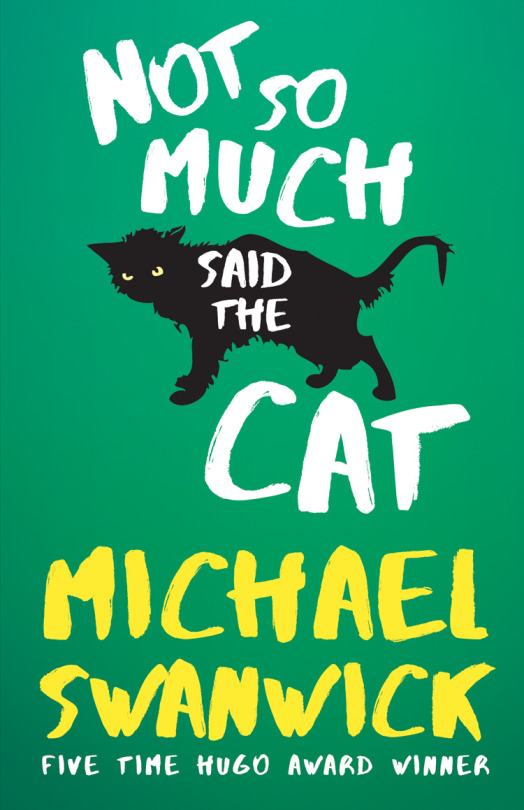NOT SO MUCH, SAID THE CAT once again proves that Micheal Swanwick is amazing

The Hungarian SF MAG raves about Michael Swanwick and NOT SO MUCH, SAID THE CAT.
A genre of literature has its masters, and one of those special American writer Michael Swanwick . He is part of a series where Neil Gaiman, Kelly Link, Ted Chiang, Ken Liu and Robert Reed is: we are all a little prose form is quite amazing. As Michael Swanwicket think more highlights from this description, the diversity, that we do not find two narratives are ugyanolyant, both in substance and form an ever-renewable, regulations exciting publishing the author speak.
<snip>
Michael Swanwick requirements of the common feature is that the real story was concerned. Swanwick tells the reader entranced. The stories immediately bevonzanak relatively short cover element is a world opened up, which would require an average of 300 pages talented writer. In many women, at first seems to be lost, but a strong and developing the main characters and supporting cast is unique, character shapes, the problems are personal and szívbemarkolók, science fiction and fantasy elements of the treatment is well done. In fact, sometimes also combines these elements, and the first not to be decided on what we read. At the end of most of the writing just sorry that we can not continue to read novels much longer. Stylistically, almost every expression, it is in place, the geometrical precision with words Swanwick.
The science fiction short stories in literary history all started with a dry kitchen syllabus was reported most were experimenting with style, wild ideas here, and it does a good job Swanwick. The well-contrived situations and in all of there is a hint of humor, wit, which certainly makes digest the often otherworldly adventures.
Postscript: the preface. It’s amazing this man. The book attempts to outline the preface of previous steps taken since 1980, the first publication to where you are now. Five Hugo- a Nebula- in a fantasy world and Theodore Sturgeon Memorial Award, after a multitude of memorable writings still be able to describe what he hopes will one day be as good a writer as much as possible. Michael Swanwick every aspect is amazing.
(Translated from Hungarian by Google)

Photo: Beth Gwinn
The WIRED podcast GEEK GUIDE’S TO THE GALAXY interviews Michael Swanwick.
“The thing about short fiction is that it doesn’t really pay,” Swanwick says in Episode 222 of the GEEK GUIDE’S TO THE GALAXY podcast. “For the amount of time that I’ve put in on these stories, I probably have not earned back—even with the collection—minimum wage.”
That lack of pay has caused many of Swanwick’s peers to give up on short fiction altogether, a fact he finds terribly upsetting. A few years ago he spoke with a friend who was reminiscing about the days when he would spend months carefully crafting a single short story, and lamenting that he could no longer afford to do so.
“My friend doesn’t write short fiction any more because it’s just not profitable, it’s not worth his time,” Swanwick says. “And his novels are doing very well. But I really, really miss his short fiction, because he was one of the best.”
Swanwick believes that short fiction serves as a proving ground for new ideas, and that more of it means more innovation and experimentation. He citesWilliam Gibson’s short story “Burning Chrome,” which served as a test case for Gibson’s classic cyberpunk novel NEUROMANCER.
“It’s really a bad idea to write something new at novel length, because you don’t know whether you can do it or not,” Swanwick says. “But you can risk a short story, and if it works in a short story, you know that you can take it to novel length.”
He fantasizes that someday a MacArthur-style grant may make it possible for more writers to focus on short fiction. But until that time, authors will have to do whatever they can to scrape by. Swanwick’s books all include a grateful tribute to the “M.C. Porter Endowment for the Arts,” a humorous reference to his wife Marianne. It’s a tradition that goes back to his first novel, IN THE DRIFT.
“At that time she was certainly earning more money than I was, so there was a degree to which she was actually supporting me,” he says. “So I would put it in as a gentle little joke.”
For more information on NOT SO MUCH, SAID THE CAT, visit the Tachyon page.
Cover design by Elizabeth Story
